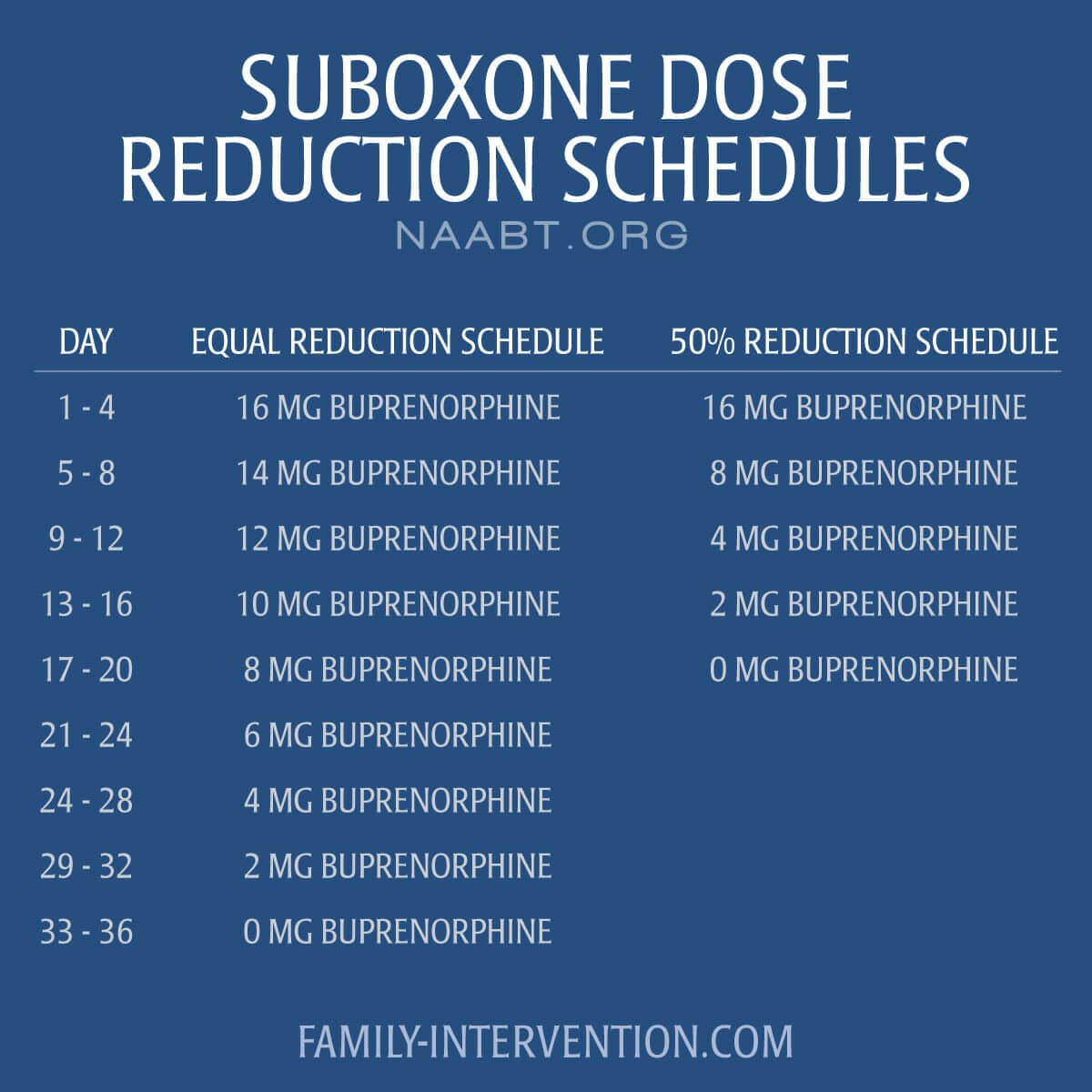Search by category, archive or keyword

When trying to help a loved one heal from the damage caused by opioid addiction, it is important to consider every tool available. In many cases, incorporating Suboxone therapy into one’s opioid addiction treatment program greatly improves the chances of achieving lasting recovery.
In this blog, we’ll look at the following:
- What Is Suboxone?
- What are the side effects of Suboxone?
- What Is Suboxone used for?
- Can I become addicted to Suboxone?
- Can I take Suboxone with other drugs or medications?
- How long will Suboxone stay in my system?
- How do you take Suboxone?
- Suboxone during opioid detox
What Is Suboxone?
Suboxone is the trade name for the combination of two medications: buprenorphine and naloxone. Suboxone is classified as an opioid partial antagonist, which means that it binds to the same brain receptors as opioid drugs such as heroin, OxyContin, Vicodin, and morphine. While Suboxone is classified as an opioid medication, it is different from other opioid drugs in a number of important ways.
Buprenorphine, one of the active ingredients in Suboxone, produces effects similar to other opioid drugs. However, buprenorphine is “abuse-resistant” in that its use does not produce a powerful high. Taking a dose beyond a certain level will not increase the drug’s effects. For this reason, experts believe that buprenorphine carries a lower risk of overdose compared to other opioid drugs.
Naloxone, the other active ingredient in Suboxone, is an opioid antagonist that blocks the effects of other opioid drugs by competing for space among the brain’s opioid receptors.
Due to Suboxone’s mechanism of action, it can be used as an effective replacement for more harmful opioid drugs during addiction treatment therapy. Since being approved by the FDA in 2002, Suboxone has been prescribed to millions of Americans for the sole purpose of aiding in the treatment of opioid addiction.
Suboxone has been marketed under a number of different names, including:
- Norspan
- Cizdol
- Buprenex
- Temgesic
- Probuphine
- Suboxone Film
- Butrans
- Zubsolv
- Bunavail
Side Effects of Suboxone
While addiction treatment professionals agree that Suboxone is a safer alternative to other opioid drugs, there are a number of potential side effects to consider. Commonly reported side effects of Suboxone to include:
- Numbness or tingling in the extremities
- Drowsiness or insomnia
- Digestive issues, including vomiting, constipation, and stomach pain
- Impaired coordination
- Difficulty concentrating
- Headaches or brief periods of dizziness
In addition to the side effects listed above, Suboxone use has been linked to more serious side effects that would require immediate medical attention. These side effects include:
- Total loss of coordination and extreme physical weakness
- Blurred or double vision
- Shallow or weak breathing
- Severe nausea and stomach pain are often associated with dark urine and clay-colored stools.
- Jaundice
- Severe cognitive impairment
- Slurred speech
- High blood pressure and palpitations

A small percentage of patients may experience a potentially life-threatening allergic reaction after taking Suboxone. Seek emergency medical care if you display any of the following symptoms:
- Difficulty breathing
- Hives
- Swelling of the tongue, throat, lips, or face
Suboxone FAQs
Learn even more about this drug by browsing through the following frequently asked questions and their accompanying answers:
What Is Suboxone Used For?
The only FDA-approved use for Suboxone is the treatment of opioid addiction. After being ingested, Suboxone can decrease the negative side effects associated with opioid withdrawal for up to 24 hours.
Can I Become Addicted to Suboxone?
Both of the active ingredients found in Suboxone interact with the same brain receptors that are activated by other opioid drugs. Consequently, Suboxone does possess potentially addictive properties. When taken exactly as prescribed, however, the risk of becoming addicted to Suboxone is minimal.
Can I Take Suboxone with Other Drugs or Medications?
Research shows that Suboxone can negatively interact with a number of other medications. To avoid a potentially dangerous response, patients should notify their healthcare professional about any concurrently prescribed medications before beginning treatment with Suboxone. Individuals taking Suboxone should refrain from using other opioid drugs and alcohol while receiving treatment.
How Long Will Suboxone Stay in My System?
After taking the last dose, Suboxone can stay in your system for up to 14 days and can be detected through hair, urine, saliva, and blood tests. Each of the two ingredients found in Suboxone has a different chemical half-life. Buprenorphine’s half-life is estimated to be 37 hours. Naloxone has a much shorter half-life of 30 to 60 minutes.

How Do You Take Suboxone?
Suboxone can be taken in two different ways. The first is sublingual, where patients allow a small Suboxone pill to dissolve under their tongue. The second is via buccal strip, where patients place a small strip of dissolvable Suboxone on the inside of their cheek.
Suboxone is poorly absorbed by the digestive system and must be administered directly into the patient’s bloodstream.
Suboxone During Opioid Detox
When opioid-addicted patients take Suboxone, opioid detox becomes a much more manageable experience. Suboxone treatment for heroin addiction and prescription opioid addiction typically begins in the form of a medically assisted inpatient detox program. For many patients, short-term Suboxone use can be a beneficial way to begin the recovery process.
Because Suboxone can greatly reduce the symptoms and cravings associated with opioid withdrawal, patients are better able to focus on other addiction treatment therapies, such as addiction counseling, cognitive behavioral therapy, and family counseling. After the patient’s brain is no longer dependent on the previously abused opioid drug, their doctor will begin to slowly wean them off Suboxone as well.
The initial stage of opioid detoxification is an incredibly trying time, and many recovering addicts end up relapsing within just days of getting clean. By quitting opiates with Suboxone therapy, however, patients can give themselves some breathing room early on, improving their odds of achieving lasting recovery.
Suboxone Opioid Maintenance Therapy

For some opioid addicts, the short-term use of Suboxone is not enough to prevent relapse while working toward recovery.
Ideally, the goal of opioid addiction treatment is to help patients end their use of all opioid drugs. However, those with a high risk of relapsing and overdosing may benefit from long-term Suboxone maintenance therapy.
There is near-unanimous agreement among addiction treatment professionals that prolonged Suboxone use is a safer alternative to heroin addiction. Although replacing one drug with another is never an ideal solution, there is no doubt that, for some opioid addicts, long-term Suboxone use is an effective way to avoid relapse, overdose, and death.
In the end, Suboxone can be a powerful tool for opioid addicts in need of a helping hand. However, it is important not to lose sight of the fact the most important benefit of Suboxone is its ability to help addicts become more receptive to comprehensive addiction treatment.
Individuals suffering from addiction must realize that they cannot blame their pattern of substance abuse solely on the drug itself. In order to achieve lasting recovery, addicts must address the underlying psychological issues that led them to abuse opioid drugs in the first place.
Suboxone Therapy Is Only One Step of the Journey
When seeking help for a loved one with opioid addiction, your first step should be to consult professionals who understand substance abuse treatment inside and out.
At Family First Intervention, we believe that the most effective way to help addicts overcome their issues with substance abuse is by following a long-term recovery strategy from day one.
Our team of certified interventionists will work side by side with your family throughout the entire recovery process, from planning the initial intervention through post-rehabilitation life coaching. We will help you find a program that won’t over-prescribe Suboxone in its attempt to help your loved one recover from opioid or heroin addiction. Contact us today to get started on the road to recovery.
An intervention is not about how to control the substance user; it is about how to let go of believing you can.
“The most formidable challenge we professionals face is families not accepting our suggested solutions. Rather, they only hear us challenging theirs. Interventions are as much about families letting go of old ideas as they are about being open to new ones. Before a family can do something about the problem, they must stop allowing the problem to persist. These same thoughts and principles apply to your loved one in need of help.”
Mike Loverde, MHS, CIP



